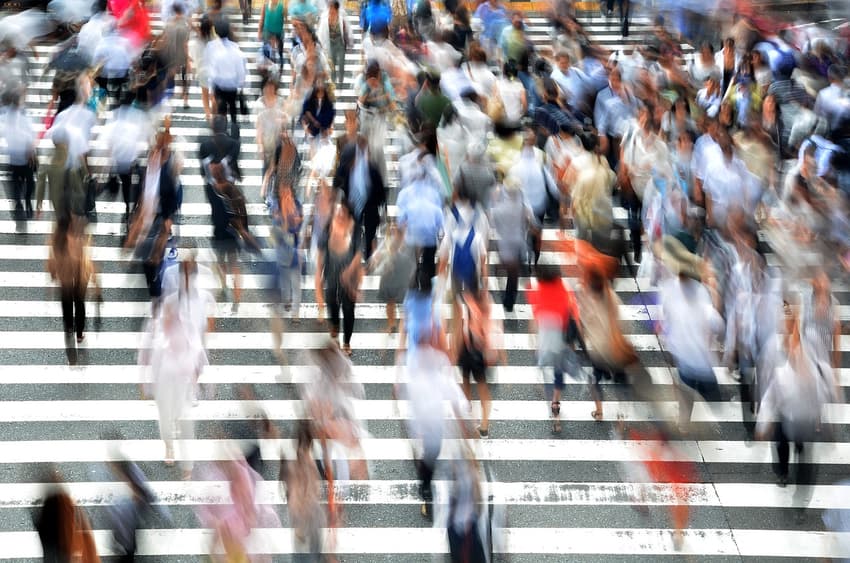What does it mean for Switzerland to have a population of 9 million people?

From a country of just 8 million people a decade ago, Switzerland's population grew to over 9 million residents in 2023 — 9.006, 664, to be exact.
According to statistics published on Wednesday by the Federal Statistical Office (FSO), 8,902,308 people are now permanent residents, while 104,356 are refugees /asylum seekers.
This means the country’s population grew by approximately 1 million people since 2013 — a substantial jump for a landlocked nation that measures only 220 km from north to south and 348 km from west to east.
What is the country’s current demographic composition?
Men represent 49.64 percent of the population and women account for 50.36 percent, according to FSO.
Among the permanent population, 73.38 percent have Swiss nationality (including those who have dual citizenship), and 26.62 percent are foreigners. As a comparison, 10 years ago, foreign nationals represented 23.8 percent of Switzerland’s total permanent resident population.
These numbers don’t include the approximately 360,000 cross-border workers who come to work in Switzerland from neighbouring countries each day.
Why are there more foreigners in Switzerland now?
The reason for the increase is simple: the growing demand in the labour market, along with wages that are higher than elsewhere in Europe.
Due to easy access to employment, most foreigners come from the EU and EFTA states — mostly Germany, France, Italy, and Portugal.
Those from the so-called ‘third countries’ that are not part of the EU / EFTA have more restricted access to the job market, though changes are (slowly) underway, as there is a huge shortage of qualified employees that can’t be filled by either the Swiss or EU / EFTA workforce.
READ ALSO: How immigration is impacting Switzerland
Are foreigners the only ones ‘responsible’ for the population growth?
They are a major factor, but not the only one.
The other reason is a higher life expectancy, which means that people are living longer than before.
In fact, Switzerland has one of the highest life expectancies in the world — 84.3 years on average, up from 82.8 a decade ago.
Where has the population growth been the strongest?
The majority of new arrivals flock to major urban centres, where most job opportunities (and highest salaries) are.
Zurich tops the list, followed by Vaud, Geneva, and Basel-City.
What’s ahead for Switzerland from a demographic point of view?
The next milestone, according to experts, is reaching the 10-million mark a few years from now.
If that happens, the current challenges, such as lack of affordable housing, will worsen, experts predict.
READ ALSO: What Switzerland needs to do to accommodate 10 million residents
Comments
See Also
According to statistics published on Wednesday by the Federal Statistical Office (FSO), 8,902,308 people are now permanent residents, while 104,356 are refugees /asylum seekers.
This means the country’s population grew by approximately 1 million people since 2013 — a substantial jump for a landlocked nation that measures only 220 km from north to south and 348 km from west to east.
What is the country’s current demographic composition?
Men represent 49.64 percent of the population and women account for 50.36 percent, according to FSO.
Among the permanent population, 73.38 percent have Swiss nationality (including those who have dual citizenship), and 26.62 percent are foreigners. As a comparison, 10 years ago, foreign nationals represented 23.8 percent of Switzerland’s total permanent resident population.
These numbers don’t include the approximately 360,000 cross-border workers who come to work in Switzerland from neighbouring countries each day.
Why are there more foreigners in Switzerland now?
The reason for the increase is simple: the growing demand in the labour market, along with wages that are higher than elsewhere in Europe.
Due to easy access to employment, most foreigners come from the EU and EFTA states — mostly Germany, France, Italy, and Portugal.
Those from the so-called ‘third countries’ that are not part of the EU / EFTA have more restricted access to the job market, though changes are (slowly) underway, as there is a huge shortage of qualified employees that can’t be filled by either the Swiss or EU / EFTA workforce.
READ ALSO: How immigration is impacting Switzerland
Are foreigners the only ones ‘responsible’ for the population growth?
They are a major factor, but not the only one.
The other reason is a higher life expectancy, which means that people are living longer than before.
In fact, Switzerland has one of the highest life expectancies in the world — 84.3 years on average, up from 82.8 a decade ago.
Where has the population growth been the strongest?
The majority of new arrivals flock to major urban centres, where most job opportunities (and highest salaries) are.
Zurich tops the list, followed by Vaud, Geneva, and Basel-City.
What’s ahead for Switzerland from a demographic point of view?
The next milestone, according to experts, is reaching the 10-million mark a few years from now.
If that happens, the current challenges, such as lack of affordable housing, will worsen, experts predict.
READ ALSO: What Switzerland needs to do to accommodate 10 million residents
Join the conversation in our comments section below. Share your own views and experience and if you have a question or suggestion for our journalists then email us at [email protected].
Please keep comments civil, constructive and on topic – and make sure to read our terms of use before getting involved.
Please log in here to leave a comment.